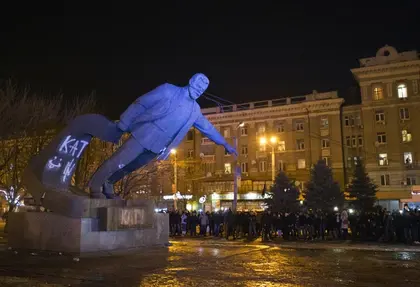Ukraine’s parliament voted on May 19 to change the name of the city, Ukraine’s
third largest, 500 kilometers to the south and east of Kyiv. A total of 253
lawmakers supported the decision, which was made in line with Ukrainian
legislation on decommunization.
According to the explanatory note for the bill, the city was named Dnipropetrovsk
in 1926, after the Dnipro, the biggest river in Ukraine, and Hryhoriy Petrovskiy,
a Soviet communist and one of the initiators of the Holodomor, an artificial famine
of 1932-1933 that left millions dead.
Local activists demolished the monument to Petrovskiy last January.
“The name includes a symbol of the communist regime, and, according to the
law, has to be changed,” the note reads.
A year ago, Parliament passed a series of laws, called the “decommunizational package.” Under the laws, Ukraine’s
parliament opened access to the archives of Soviet security agencies, banned
Communist and Nazi symbols and propaganda, and granted special status to all
military formations of the 20th century that fought for Ukrainian independence.
The name of the Dnipropetrovsk
Oblast will stay the same, at least for now, according to the head of the
Ukrainian Institute for the National Memory, Volodymyr Viatrovych. He said that
since the name of the oblast is mentioned in the Constitution, it can’t be
changed very easily.
Borys Filatov, the mayor of
Dnipro, reacted to the news on his Facebook page, saying that he considered
renaming of “the city controversial and irrelevant.” He said the residents of
the city have never associated the name Dnipropetrovsk with the persecutors of
the Ukrainian nation.
“However, the law is the law,
and we will follow it,” he said.
But Oleksandr Vilkul, a lawmaker with the Opposition
Bloc and Filatov’s main rival at the last mayoral elections, said he would
fight the renaming.
He said that at least 90 percent of Dnipro’s citizens
are against the move. According to Vilkul, the name of the city should have
stayed Dnipropetrovsk, but with the etymology of the name changed.
“It should have been Dnipro – after the river, and
Petrovsk – after Saint Peter,” Vilkul said. Another option, according to
Vilkul, would be to hold a referendum on the issue.
Together with another lawmaker from the Opposition
Bloc, Dmytro Kolesnikov, Vilkul on May 19 registered a draft law aimed at
canceling the law that renamed the city.
Andriy Parubiy, the speaker of Verkhovna Rada, said while
presenting the law that the renaming had been done “completely with the
agreement of the local communities.”
Social media users from Dnipro had various reactions,
with some saying that “everyone called it Dnipro anyway,” and others voicing
regrets, noting that the name should have better stayed as it was, just with
the meaning changed.
For many, the biggest issue was that the new city’s
name would require them to change all official documents.
Anastasiia Subbotina, a native of Dnipro, who now
lives in Amsterdam, Netherlands, is one of them.
“What should I do with my documents now?” she
wondered. “Now all my documents name a city that doesn’t exist.”
After the vote on Dnipro, Ukraine’s parliament adopted
another law that renamed more than 500 villages and cities in various
Oblasts of Ukraine as part of the decommunization campaign.
Parubiy said he hoped that the renaming process under decommunization would
be over by the end of next week.
Kyiv Post staff writer Alyona Zhuk can be reached at [email protected]
You can also highlight the text and press Ctrl + Enter




